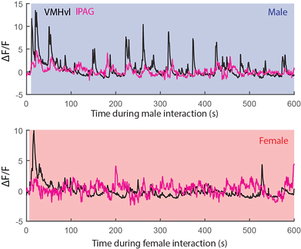

FALKNER LAB
Researching how social experience changes the brain
at the Princeton Neuroscience Institute
OUR GOAL
When we engage in social interactions, these experiences change our perception of the world and our choice of future actions. These social experiences can be trivial and everyday (e.g., interacting with a friend or neighbor) or can be life-changing and profound (e.g., having a child). Subcortical structures in the brain including the hypothalamus, amygdala, and midbrain are critical for initiating and maintaining social interactions including mating, aggression, prosocial, and parental behaviors. In our lab, we are interested in how social experiences change the computational properties of these neural circuits and alter information flow to change behavior. We interrogate the roles of these circuits at many levels in the behaving animal using a combination of electrophysiology, molecular tools for perturbation, cell-type specific imaging, quantitative behavior analysis, and modeling. In addition, we design and deploy novel tasks for assaying social behavior in mice to better detect and quantify social dysfunction.
OUR APPROACH

ELECTROPHYSIOLOGY & DYNAMICS

VIRAL TOOLS FOR ANATOMICAL TRACING

BEHAVIORAL QUANTIFICATION AND ANALYSIS

CELL-TYPE SPECIFIC OPTICAL RECORDING

CIRCUIT MODELS

OPTOGENETICS
WE ARE LOCATED AT THE PRINCETON NEUROSCIENCE INSTITUTE ON THE PRINCETON CAMPUS
We welcome all inquiries. Please get in touch with questions about the lab.
